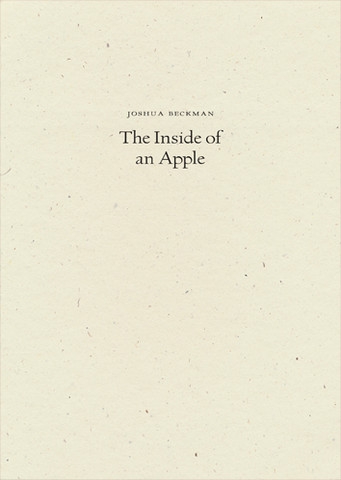The Inside of an Apple
 Joshua Beckman is an editor at Wave Books, and The Inside of an Apple is his seventh poetry collection. At its best, his poetry is composed of whimsical snapshots, reminiscent of haikus, as in this moment halfway through “Being in ways”:
Joshua Beckman is an editor at Wave Books, and The Inside of an Apple is his seventh poetry collection. At its best, his poetry is composed of whimsical snapshots, reminiscent of haikus, as in this moment halfway through “Being in ways”:
Joshua Beckman is an editor at Wave Books, and The Inside of an Apple is his seventh poetry collection. At its best, his poetry is composed of whimsical snapshots, reminiscent of haikus, as in this moment halfway through “Being in ways”:
You cut a scallion and there’s
a little green circle
it’s like a field the smell the grass makes.
You cut a piece of straw, it’s gold.
Beckman mixes nature images with modern slang. His philosophical ramblings taper off mid-thought, and sometimes remain incomplete. There’s a slippery, lilting voice at work here, pulling fragments from everyday speech as well as the work of Proust and Henry David Thoreau, and the casual phrasing can suggest deceptively simple chains of logic, as when “The Plant” proceeds from foot to sock to thought:
around my mind a thought
the foot means I am like a person to a thought
and the thought means I am like a plant to the sun
The earth feels made to the sky, no?
As the poem shifts unexpectedly in a new direction, it becomes unexpectedly lovely.
The poems that make up The Inside of an Apple are light-hearted even when they’re sad. They’re also fragmentary, appearing without titles, blurring where one poem ends and the next begins. But this is by design; the poems’ sentence fragments are highly visual, and show great care for sound.
The use of underlining in lieu of bold text visually suggests a typewriter manuscript, a conceit supported by the way many poems eschew regular margins. Instead, the lines trickle this way and that across the pages, or normal justification is broken occasionally by indents, as if the book has been pecked out by hand on a typewriter with its carriage jangling loose.
The Inside of an Apple is flawlessly presented, like so many of Wave Books’ releases; as an object, it’s a sound argument against print books ever going extinct. Comfortably pocket-sized at 5 x 7.5 inches, the paperback is printed on quality paper, and the typesetting and design show great care; the font is ornamental but prioritizes readability.
This is the kind of poetry that makes for ideal summer reading: it’s short, whimsical, and easy to dive into on any page.





